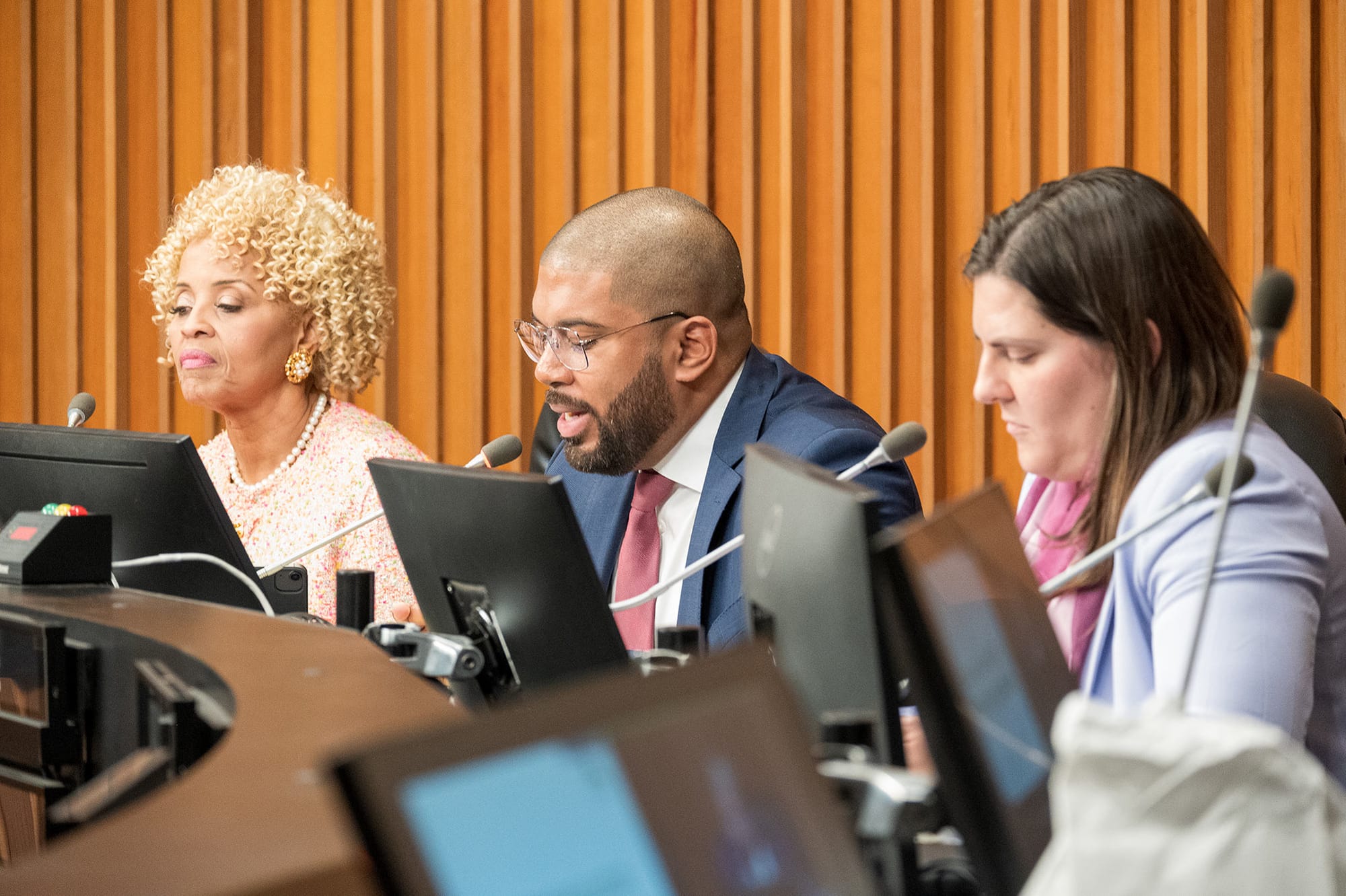VALLEJO – A group of Mare Island residents submitted a formal request to the state Controller's office last week to perform an independent audit of the City of Vallejo’s accounting and use of special taxes charged to island residents.
The residents, who have organized under the name Mare Island Special Tax Elimination Alliance, have been seeking relief from special taxes since 2012, saying the taxes are far in excess of what mainland residents pay.
On Monday, the group issued a press release and a letter to state Controller Malia Cohen asking her to conduct an audit of the city of Vallejo’s accounting related to the Mare Island Community Facilities District (CFD), a special tax district enacted by the city and developer Lennar in 2002 to fund police and fire services on the island.
These taxes were levied on new property owners as residential developments were built and sold and have resulted in Mare Island’s 322 homeowners paying thousands of dollars more per month in taxes than other Vallejo homeowners.
Mare Island’s taxes designed to sunset, but development has been slow
While many Mare Island property owners acknowledge they were alerted to the higher tax costs when they purchased their homes, they say they were told that the costs would sunset as development advanced on the island. But development of the island has not proceeded as quickly as expected and the high taxes haven’t declined as promised.
The alliance argues that the CFD tax structure is now constricting the very development that was intended to reduce their taxes. They say that the city provides limited services on the island and has become reliant on their taxes to provide police and fire services to the entire city even though state law requires CFD funds to be used for services within the district.
The taxes were originally intended to fill a gap left behind with the departure of the U.S. Navy from Mare Island in 1996. As the Navy was leaving Mare Island, it paid the city approximately $5 million a year to cover the cost of services until 2001.
City Attorney Veronica Nebb said during a City Council meeting last April that when the city took over the island they were not willing to move forward with development unless there was no cost to the city, so the developer would need to find a way for the project to be revenue neutral.
The city tapped Lennar to develop the island, one of the largest developers in the U.S. which also handled development of Treasure Island and more recently San Francisco’s Hunter’s Point. Lennar had planned to build over 1,000 homes on Mare Island, but departed the project in 2019 with the sale of 500 acres to the Nimitz Group LLC.
Mare Island CFD taxes are structured so residents pay their maximum tax first and then the remainder of the total tax is levied on commercial properties. City officials have claimed that this was done to stabilize the amount of taxes that residential property owners would pay year after year. But it also meant that any reductions in the taxes from increased development on the island would benefit commercial properties first.
“Many of us are retired,” said Alliance member Sherianne Grimm, who contributed research to the letter. “Why should residents be subsidizing profit generating businesses?”
But even with a tax structure favorable to commercial properties, businesses on the island have complained that it is hampering their ability to operate.
Lennar itself complained in a letter to Vallejo’s city manager in January 2008 that, “The current CFD system will continue to slow economic development, cause existing businesses to move off Mare Island, cap property values and create long term liability to the city’s general fund.” The last operating fire station on the Island was closed in 2009 when the city slashed the budget for island services after Lennar refused to pay a portion of its taxes.
Mare Island-based metal recycler Alco sued the city in 2010, alleging that the high tax burdens on Alco’s property made the land “essentially valueless” and that the city had failed to take enforcement action to fairly collect taxes from all property owners, including Lennar.
According to the lawsuit, the city knew that the tax rate would be onerous even before it enacted the CFD. The city commissioned a task force to provide an independent review of initial proposals for the island’s tax structure, which expressed concerns over the high tax burdens that would be placed on property owners and noted that it is unusual for the developer to pass costs on to tenants and property owners before the developer delivers a finished product. The task force recommended postponing the facilities district until the project was more complete, according to Alco’s lawsuit.
Alco’s lawsuit was transferred to federal bankruptcy court during the city’s 2012 bankruptcy and then dismissed under the condition that the city make changes in the method of apportionment of the tax. Alliance members claim that the city defied this agreement and never made the promised changes.
Mare Island residents seek tax relief
Arguing that they are drowning in excessive taxes, in recent years the Mare Island residents’ group has stepped up their efforts by frequently attending city council meetings and urging councilmembers to address their concerns.
The council received a presentation from the group in May, in which they explained their grievances. If the council agreed to call a vote, residents of the district could overturn the taxes with a two-thirds majority.
But the results could be overturned by a protest by a majority of landowners. The Mare Island Company – a partnership between the Nimitz Group LLC and the Southern Land Company, which bought 157 acres of North Mare Island from the city in 2022 – could block any changes and has indicated that for now it supports the taxes. The company and the city want to complete the Mare Island specific plan, expected in April 2025, before making any tax adjustments.
The residents also proposed that the council could simply remove the CFD tax revenue from the budget for the 2023-2024 fiscal year. But after a report from City Manager Mike Malone, which claimed that eliminating the Mare Island special taxes would require the city to eliminate several public safety positions in the police and fire department, the council has not taken action on the issue.
The city’s public employee unions balked at Malone’s suggestion, saying he was using them as “pawns in a political game.” Meanwhile, the Mare Island residents have said that it shows how the special tax revenue is inappropriately being used to bolster the city’s general fund.
“They look at us like their piggy bank,” Grimm said. “If we don’t get them to reduce the taxes now, who knows what costs they might hold us responsible for.”
Without action from the city council, alliance members hope that a state audit of CFD finances can bring them relief. The residents claim that the city has not used the revenue appropriately, pointing to what they say are several anomalies in the city’s accounting practices.
Letter flags concerns with Vallejo’s accounting of Mare Island taxes
Their letter lists 12 issues of concern and alleges that the city has violated state laws or municipal codes in eight instances through administration and accounting of Mare Island tax revenue. It included over 200 pages of documents that members claim provide evidence that the city has mishandled CFD funds.
Several of the issues laid out in the letter relate to how the city determines the cost to provide police and fire service on Mare Island.
According to a memo from Goodwin & Associates, the city’s consultant on the Mare Island CFDs, Mare Island’s share of police and fire services are determined based on estimates of the population served and the square footage of buildings on the island. This calculation results in a percentage of the total police and fire budgets that Mare Island property owners are responsible for. In 2010, the reference year that the Goodwin memo refers to, Mare Island taxpayers were found to be responsible for 1.85% of the police department’s costs and 8.57% of the fire department’s costs.
Mare Island residents allege two main problems with this formula: they claim that because police and fire budgets increase year after year and their maximum tax rate is tied to these budgets, this allows their maximum tax rate to increase every year by more than the state limit for CFDs on residential properties of 2%.
The alliance’s second problem with this calculation relates to the recent staffing shortages at the city’s police and fire departments. The group alleges that because the city has used salary savings from vacant positions to balance the city’s budget, money that is required under state law to be used for CFD services has been misappropriated for use in the city’s general fund.
In a response to questions from the Vallejo Sun, city of Vallejo officials said that full staffing levels in the police and fire departments are used to generate the initial budget expenditures for Mare Island but at the end of the fiscal year the city performs a true-up process to reallocate costs based on the actual filled positions.
Furthermore, the group says that according to the original terms of the CFD, a number of city revenue sources generated on the Island should be deducted from the CFD tax liability, but the group alleges that the city has not accurately applied some of these revenues that would reduce their tax burden, such as sales tax, business license fees, property transfer taxes and other revenues.
The group pointed to scope of work documents from 2020 that indicate that the city hired a law firm to do a study of additional revenues that could qualify as CFD deductions. But the letter states that the city finance director did not respond to emails requesting copies of the study and the group says the city did not provide a final report in response to a public records request.
For the Mare Island residents, it all adds up to a tax structure that the city has grown dependent on, but which is not to the long-term benefit of the city, and they are seeking relief any way they can find it.
”MISTEA has factually documented critical concerns with the management of public tax dollars that demand the scrutiny of an unbiased and transparent audit,” Grimm said. “This is a necessary first step towards accountability and the possible restoration of any trust with the City of Vallejo.”
Before you go...
It’s expensive to produce the kind of high-quality journalism we do at the Vallejo Sun. And we rely on reader support so we can keep publishing.
If you enjoy our regular beat reporting, in-depth investigations, and deep-dive podcast episodes, chip in so we can keep doing this work and bringing you the journalism you rely on.
Click here to become a sustaining member of our newsroom.
THE VALLEJO SUN NEWSLETTER
Investigative reporting, regular updates, events and more
- government
- business
- Vallejo
- Mare Island
- Mare Island Special Tax Elimination Alliance
- Malia Cohen
- Mare Island Company
- Lennar
- Veronica Nebb
- Nimitz Group
- Sherianne Grimm
- Alco
- Mike Malone

Ryan Geller
Ryan Geller writes about transitions in food, health, housing, environment, and agriculture. He covers City Hall for the Vallejo Sun.
follow me :




